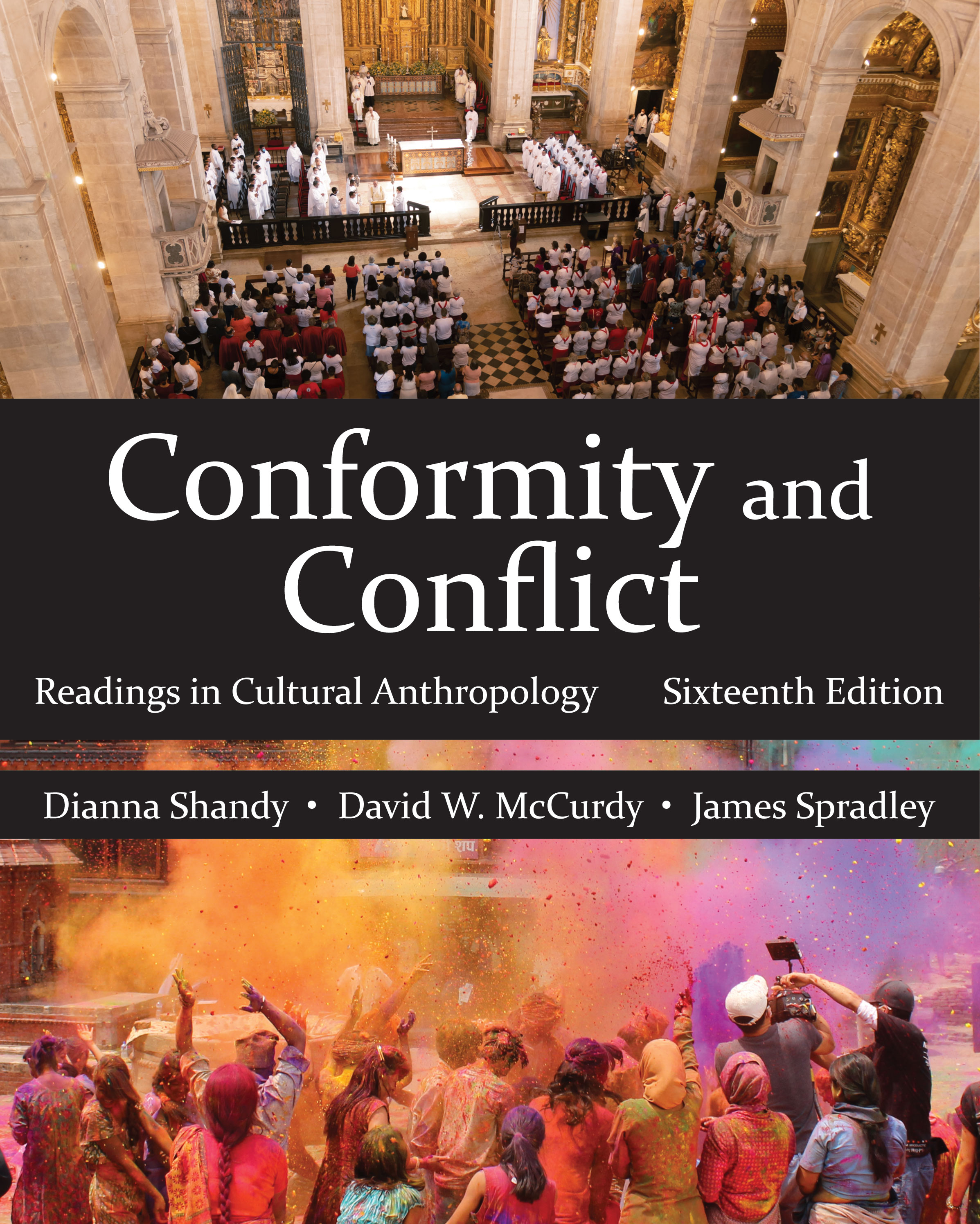Part One: CULTURE, ETHNOGRAPHY, AND THINKING LIKE AN ANTHROPOLOGIST
1. Ethnography and Culture (James P. Spradley)
2. Eating Christmas in the Kalahari (Richard Borshay Lee)
3. Fieldwork on Prostitution in the Era of AIDS (Claire E. Sterk)
4. Nice Girls Don't Talk to Rastas (George Gmelch)
Part Two: LANGUAGE, COMMUNICATION, AND MEANING
5. Shakespeare in the Bush (Laura Bohannan)
6. Speaking in Tunes: Traditional Irish Music Sessions as a "Conversation" (Adam Kaul)
7. The Power of Talk: Who Gets Heard and Why (Deborah Tannen)
8. Creating Humor in the Middle East (William O. Beeman)
Part Three: ECOLOGY, SUSTAINABILITY, AND FOODWAYS
9. Forest Development the Indian Way (Richard K. Reed)
10. The Truth about "Sustainable" Palm Oil (Sophie Chao)
11. We Are Going Underwater (Susan A. Crate)
12. Black Food Geographies (Ashanté M. Reese)
Part Four: ECONOMIES, EXCHANGE, AND LIVELIHOODS
13. Reciprocity and the Power of Giving (Lee Cronk)
14. The Violence of the American Dream (Philippe Bourgois, Laurie Kain Hart, George Karandinos, and Fernando Montero)
15. Women in the Mine (Jessica Smith)
16. Finance, FAFSA, and Households (Caitilin Zaloom)
Part Five: FAMILY, MARRIAGE, AND POWER
17. Mother's Love: Death without Weeping (Nancy Scheper-Hughes)
18. Family and Kinship in Village India (David W. McCurdy)
19. Marriage and Adulthood in West Africa (Susanna Fioratta)
20. Polyandry: When Brothers Take a Wife (Melvyn C. Goldstein)
Part Six: IDENTITY, GROUPS, AND INEQUALITY
21. Negotiating Work and Family in America (Dianna Shandy and Karine Moe)
22. Motorcycles, Membership, and Belonging (David W. McCurdy)
23. Mixed Blood (Jefferson M. Fish)
24. Boas, Orphan Trains, and Native American Boarding Schools: The Racist Antiracism of American Anthropology (Lee D. Baker)
Part Seven: LAW, POLITICS, AND DISORDER
25. Public Anthropology in Asylum Courts (M. Gabriela Torres)
26. Cross-Cultural Law: The Case of an American Gypsy (Anne Sutherland)
27. Remembering the Disappeared in Peru (Olga González)
28. The Politics of Laughter: Why Cartoons Matter (Ritu Gairola Khanduri)
Part Eight: RELIGION, MAGIC, AND WORLDVIEW
29. Body Ritual among the Nacirema (Horace Miner)
30. The Worst Lover: Boyfriend Spirits in Senegal (Rachel Mueller)
31. Baseball Magic (George Gmelch)
32. Everyday Ritual on the Lebanon Mountain Trail (Kevin Boueri)
Part Nine: GLOBALIZATION, CULTURE, AND A WORLD ON THE MOVE
33. Nuer Refugees in America (Dianna Shandy)
34. Village Walks: Tourism and Globalization among the Tharu of Nepal (Arjun Guneratne and Kate Bjork)
35. Becoming Muslim in Europe (Mikaela Rogozen-Soltar)
36. #potsandpans: Rethinking Social Media in Istanbul during Occupy Gezi (Zeynep Devrim Gürsel)
Part Ten: USING, DOING, AND APPLYING ANTHROPOLOGY
37. Public Interest Ethnography: Women's Prisons and Health Care in California (Rachael Stryker)
38. Using Anthropology (David W. McCurdy)
39. Anthropology and User Experience: Why Anthropologists Are Perfectly Trained for a Profession They Have Never Heard Of (Juliette St. Andrew)
40. The Heart of the Problem: Conformity and Conflict (Ed Liebow)
Glossary

332 pages, $57.95 list
1-4786-5155-5
978-1-4786-5155-0
© 2024
paperback
Instructor's resource materials available here
To obtain a username and password to access these materials, contact comps@waveland.com.
To obtain a username and password to access these materials, contact comps@waveland.com.
eBook availability
Conformity and Conflict
Readings in Cultural Anthropology
Sixteenth Edition
This best-selling collection of engaging articles has enlivened cultural anthropology courses for decades. The lead editor of the sixteenth edition, Dianna Shandy, first encountered Conformity and Conflict as an undergraduate and began teaching from the book in 1999. From the first through the sixteenth edition, the editors have chosen classic works and solicited original pieces that powerfully illuminate the nature of culture and its influence on people’s lives. One of the overarching principles through the years has been to include material on North American cultures so readers can make their own cultural comparisons and see the relevance of anthropology to their own lives. Readers sharpen critical thinking skills as they examine their assumptions, identify perspectives, and assess their beliefs.
Selections are organized around topics found in many textbooks and courses, facilitating usage by instructors who do not want to assign a standard text. Part introductions include discussion of many basic anthropological definitions. Article introductions coherently and systematically link selections to anthropological concepts. Sections and selections include environmental, global, and practicing anthropological subfields as well as traditional interests such as language, gender, kinship, economics, politics, law, inequality, and religion. The forty readings in this collection cover a broad range of theoretical perspectives, juxtaposing classic and contemporary ethnographic work to introduce students to a broad range of authors. The selections provide a fascinating way to look at human experience and make sense of the world around us.
Selections are organized around topics found in many textbooks and courses, facilitating usage by instructors who do not want to assign a standard text. Part introductions include discussion of many basic anthropological definitions. Article introductions coherently and systematically link selections to anthropological concepts. Sections and selections include environmental, global, and practicing anthropological subfields as well as traditional interests such as language, gender, kinship, economics, politics, law, inequality, and religion. The forty readings in this collection cover a broad range of theoretical perspectives, juxtaposing classic and contemporary ethnographic work to introduce students to a broad range of authors. The selections provide a fascinating way to look at human experience and make sense of the world around us.